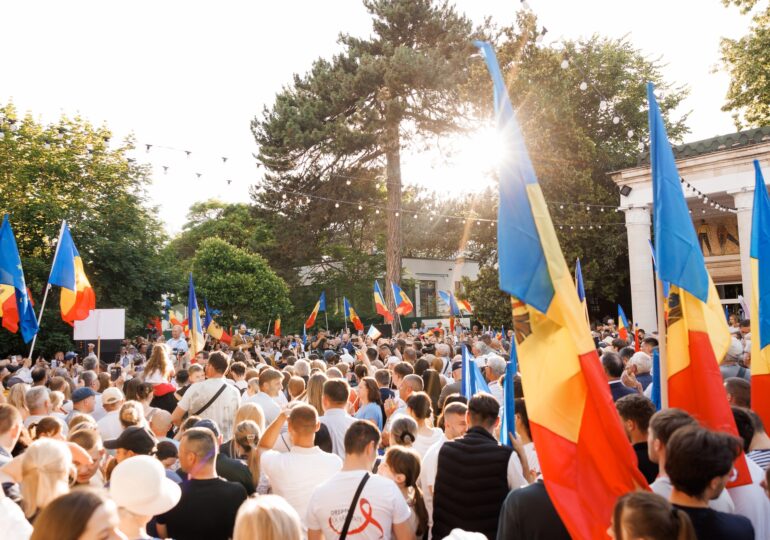Moldova is preparing to vote on Sunday, September 28, in what President Maia Sandu has called the most important elections in the country’s history. The stakes are not only the future government but also the country’s strategic direction: continuing the European path or returning under Russia’s influence.
The Action and Solidarity Party (PAS), pro-European and currently in power, risks losing the majority. Polls are uncertain, and the diaspora and undecided voters could determine the outcome.
The Russian scenario: a "reverse Euromaidan"
The Institute for the Study of War (ISW) warns that Russia is preparing the ground for street protests that could deliberately turn into violence. Objective: the removal of Maia Sandu.
Moscow is trying to create a "reverse Euromaidan" - an artificial replica of the pro-European movement in 2014 in Ukraine, but this time to push Chișinău back into the Kremlin's orbit.
The Russian Foreign Intelligence Service (SVR) has recently made a series of hallucinatory accusations, claiming that NATO is preparing to invade Moldova after the elections. According to the propaganda, French and British troops are in Odesa, ready to land to intimidate Transnistria, and Brussels is planning to occupy Moldova to "impose the dictatorship" of Maia Sandu.
In reality, Western military personnel are participating in long-planned NATO maneuvers in Romania and Bulgaria, such as the "Dacian Fall 2025" exercise.
Training for destabilization
Moldovan authorities have confirmed that groups of young people have been sent to Serbia, where they received training for provocations, street violence, and the use of weapons.
The Director of the Moldovan Intelligence and Security Service (SIS), Alexandru Musteață, revealed that a GRU officer (Russia's foreign intelligence agency) with experience in Europe, Asia, and Africa personally coordinated these actions. Funding allegedly came through the fugitive oligarch Ilan Șor, directly involved in Kremlin's influence networks.
Bloomberg recently reported consulting internal documents of the Russian Presidential Administration, finalized in the spring of 2025. They detail the steps for interfering in Moldovan elections: recruiting athletes and members of criminal networks to provoke violence, manipulating the perception of "fraud," and organizing demonstrations for Maia Sandu's resignation, regardless of the voting outcome.
The narrative of "annulled elections"
Another key element is spreading the idea that Sandu is expected to annul the election, similar to the precedent in Romania, where the presidential elections of November 2024 were invalidated due to external interference.
Igor Dodon and Ilan Șor, both connected to Moscow, have already called for protests starting on September 29, either to challenge a potential PAS victory or to denounce an alleged annulment of the results.
The Institute for the Study of War (ISW) warns that Russia could organize armed provocations in Transnistria to blame Chișinău or NATO. These "false flag" scenarios have been used by Moscow in the past.
Meanwhile, Telegram networks controlled by Șor and Dodon are spreading alarmist messages: that Moldova could be used as "cannon fodder" by the West or that Sandu is preparing massive voter fraud.
Financial networks, paid trolls, and the possible removal of Maia Sandu
Ilan Șor, convicted in the "billion-dollar theft" case, has strengthened his ties with the Kremlin. He recently appeared at an event alongside Vladimir Putin and the heads of major Russian state banks involved in sanctions evasion schemes.
According to ISW, troll networks funded through cryptocurrencies and Russian bank accounts pay users to spread disinformation in the Moldovan public space.
The Constitution of the Republic of Moldova allows the president's removal by a two-thirds vote in Parliament and a decision by the Supreme Court. The Kremlin could use protests to pressure lawmakers to support such a procedure. The plan relies on creating chaos and exploiting the population's dissatisfaction to accuse Sandu of calling on European troops to suppress the protests.
A refined manual of interference
ISW experts emphasize that Russia is applying lessons learned from previous interference campaigns in Ukraine, Georgia, and Romania.
Unlike the more rudimentary tactics of the past, the Kremlin now combines online disinformation, funding of protests, infiltration of provocateurs, and intimidation campaigns to achieve the same strategic objective: bringing Moldova back into its sphere of influence.

